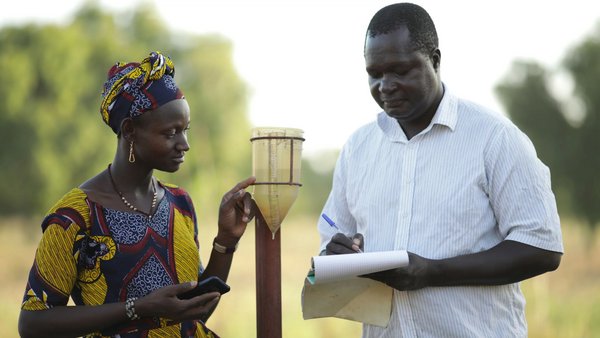 Read this article in French
Read this article in French- Share this article
- Subscribe to our newsletter
Helvetas – new strategies to adapt to climate change in Mali
"Previously, we would start planting right after the first rains. Today, we know that for a successful harvest, planting can only take place when at least 30 millimetres of rain has fallen, so that the soil is sufficiently moist," says Sidiki Coulibaly, farmer and weather data collector in M'Penesso, in the south of Mali.
In Mali over the past 30 years, the effects of climate change have become increasingly evident. Rainfall is now concentrated in a much shorter period, and tends to be very heavy. Sometimes storms are so severe that they cause local flooding. When they occur, droughts, are also more severe. Over-exploitation of land makes the situation worse. Soils are depleted by conventional farming practices and are unable to retain water. Each year, farmers are therefore tempted to move to new farmland by cutting what little woodland remains, aggravating desertification and food insecurity. The result is discouraged families, especially young people, leaving in search of a better chance elsewhere.
In 2020, the Swiss development organisation Helvetas started the Nyèsigi project, which in Bambara means "Let's build our future". The project’s objective is to work with small farmers and local partner organisations in order to strengthen the resilience of the farmers to climate change at different levels.
Meteorological information and adapted techniques
Changing conditions require farmers, herders and their families to change the way they work and establish a new balance with the ecosystems on which their livelihoods depend.
The first step is to learn how to plan field activities, and for this it is essential to have access to timely and reliable information on rainfall. Young people are trained to collect meteorological data using smart phones. These data are sent to the national meteorological service for analysis and for the elaboration of agricultural advice, which is then shared with the farmers by telephone and radio, or in village assemblies.
Farmers are learning to apply new, more sustainable production techniques, but they are also rediscovering traditional practices to rehabilitate poor land and conserve water. They use adapted seeds made available through a network of farmers at local level. They are also encouraged to make the most of difficult situations, for example by growing short-cycle crops in the mud of flooded fields.
Conserving resources and creating jobs in green sectors
The impact of climate change on the availability and quality of natural resources on which the people of Mali depend jeopardises household livelihoods and risks fuelling conflicts, particularly over access to water and land.
Conserving resources to reduce the vulnerability of communities and mitigate greenhouse gas emissions is one of the most important challenges in the fight against climate change. But at the same time, it represents an interesting opportunity to improve the income of women and youth and creates jobs in the green economy.
The Nyèsigi project works to rehabilitate dams and increase water availability for the benefit of farmers, herders and fishermen. It also promotes the use of alternative technologies, such as improved stoves and ovens that use less wood for cooking, and helps to safeguard wooded areas. This innovation allows women to produce higher quality smoked fish that can be preserved longer.
With more fishing, facilitated by the presence of water in reservoirs, and better technology for fish conservation, women can improve their business and earn more money to support their families.
In addition, in collaboration with specialised suppliers, the project trains and accompanies young people in the promotion of solar equipment, such as pumps that are installed in market gardening perimeters to facilitate access to water and increase production.
Finally, Helvetas encourages municipalities to invest public funding in activities that increase the resilience of communities to climate change. (The project encourages municipalities to invest public funds in activities that increase community resilience to climate change.)
(Helvetas/wi)
More information:
Helvetas’ engagement in Mali





Add a comment
Be the First to Comment